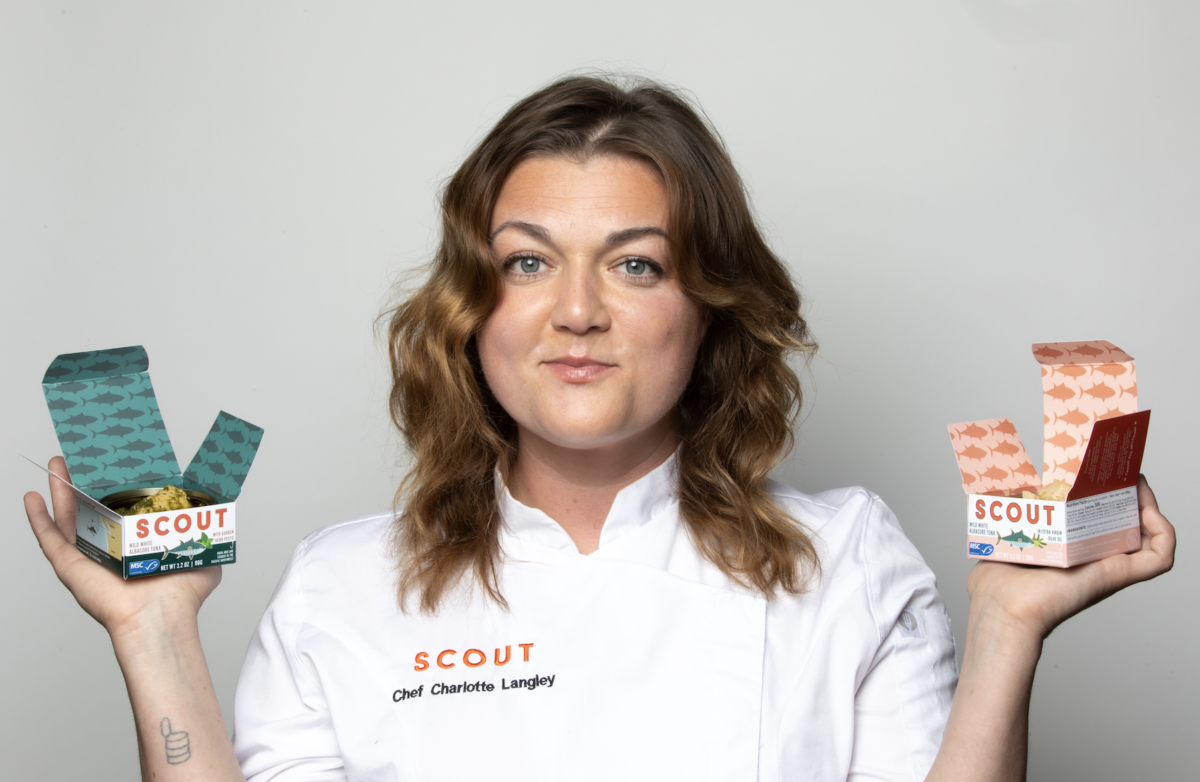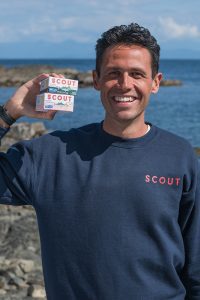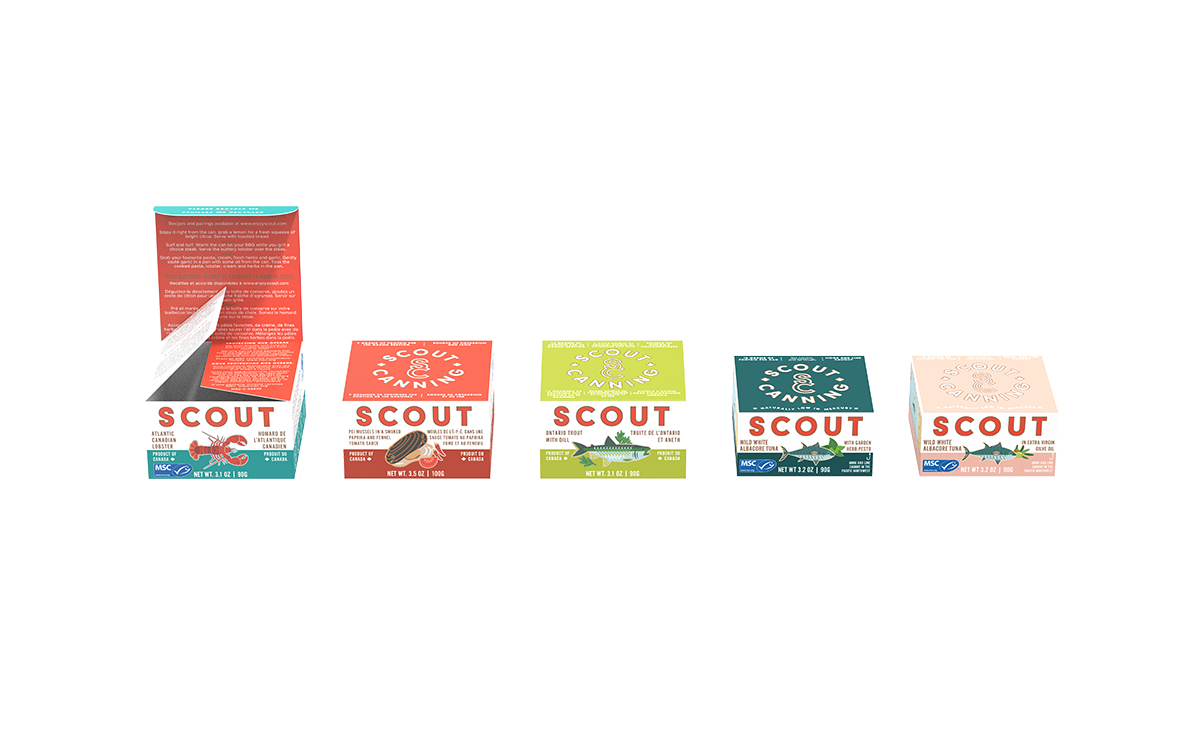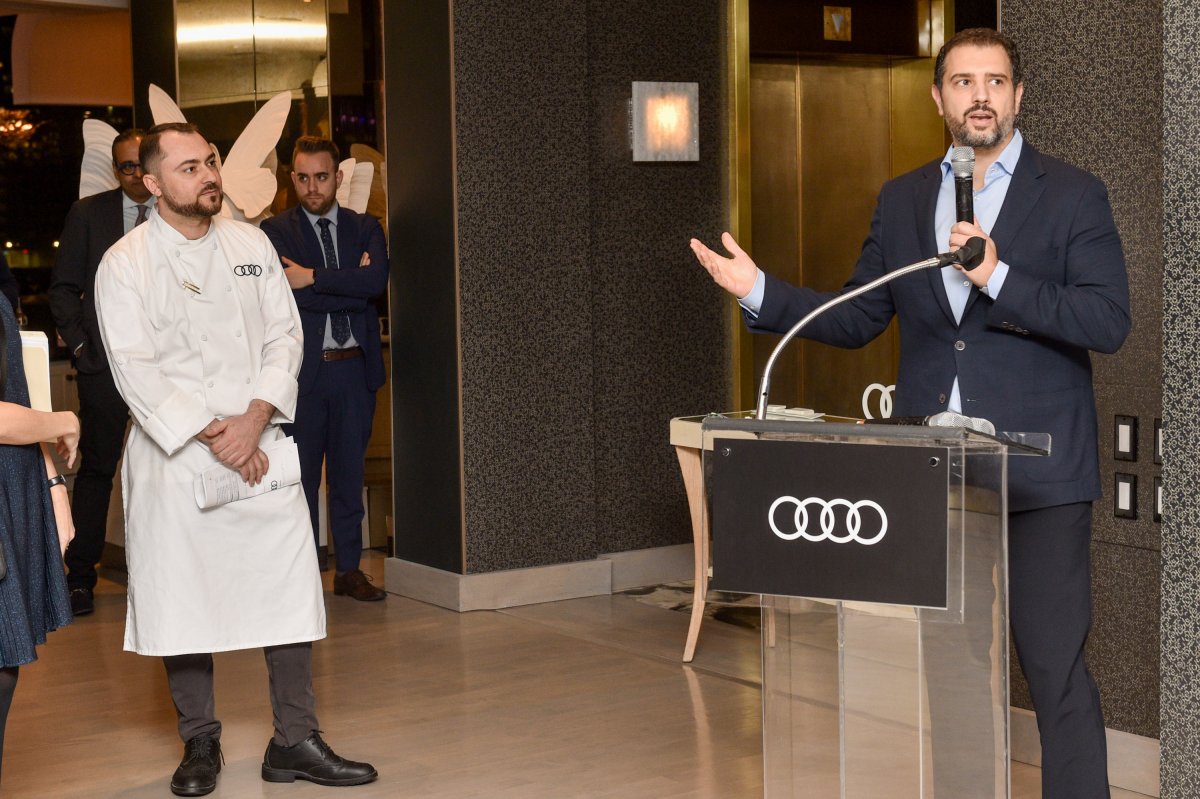[vc_row][vc_column][vc_column_text]Scout Canning is on a mission to be North America’s most trusted seafood brand. How? By being sustainable, accountable and enjoyable.
The craft canned seafood company wants to change the reputation of the fishing industry. With a short supply chain and direct sourcing relationships, Scout ensures full quality control and traceability of its products.
“We have a high standard for sourcing and we work with partners that share our values and practice environmental stewardship,” said Chef Charlotte Langley, co-founder and Chief Culinary Officer of Scout Canning.
Working with small-scale, sustainable fisheries along the coast of Canada and the U.S., Scout offers products like buttery Atlantic lobster, and PEI mussels in smoked paprika and fennel tomato sauce.
In addition to its sourcing practices, through using the canning process, Scout products have an increased shelf life compared to its fresh or frozen counterparts (50% of which can end up in the landfill), without skipping on the taste.
All of these efforts reflect the company’s values of reducing food waste and protecting the oceans.
“We engage and educate, we participate in activism on behalf of people and our planet,” said Adam Bent, co-founder and CEO of Scout Canning. “Food is political, and we do a lot of unseen work behind the scenes trying to be as responsible as possible.”
With 74 percent of Canadian consumers saying that sustainability is a main factor when making purchasing decisions, Scout Canning is proving to be a leader in how companies should operate.
For this week’s Start-Up Spotlight, Bay Street Bull spoke with Chef Charlotte Langley and Adam Bent, co-founders of Scout Canning, about the shaking up the seafood industry and the importance of sustainable business practices.[/vc_column_text][vc_text_separator title=”Q&A” color=”custom” style=”dashed” border_width=”3″ accent_color=”#ff4f49″][vc_column_text]


How did the idea for Scout Canning come about?
Charlotte: The idea was inspired by providing chef prepared seafood cuisine at home that expanded into a bigger vision. At Scout, our mission is to become the most trusted seafood brand in North America while reducing food waste and protecting our oceans. What better way to share that vision than by creating nutritious, delicious and sustainable tinned fish that connects North Americans with quality seafood caught from their own oceans and waterways.
What was missing from the canned seafood market, and how does Scout fill the gap?
Adam: We saw a white space in a large CPG category that wasn’t being tackled by emerging brands, which is what’s happened in most other food/CPG categories. The incumbent brands in our space still source from global supply chains with human rights and environmental violations, and they don’t do anything to engage consumers in climate action or connect what they do back to ocean health. A lot of them still use plastic in their supply chains. We wanted to be everything that the status quo brands have failed to be. Our fishers and processors are paid fairly and we take people and the planet into consideration with every decision we make. We are a mission based North American craft cannery, focusing on diverse species with chef created and locally sourced products.
What was the process of choosing the right suppliers to ensure the best quality seafood like?
C: We started Scout by building on our relationships with small fishers and artisan producers, we have a high standard for sourcing and we work with partners that share our values and practice environmental stewardship. The quality of the additional ingredients we use to enhance the seafood is just as important as the seafood itself, for example, we choose an organic extra virgin olive oil sourced from Tunisia for our Albacore Tuna and we used cold-pressed sunflower oil from a fourth generation family farm in Ontario for our lobster, trout, and mussels.


Why was it important to work with small-scale, sustainable fisheries?
A: Having a short supply chain with direct sourcing relationships gives us full quality control and traceability from boat to table. The further your seafood comes from means it’s often changed hands multiple times, making it difficult to assess ethical sourcing. We work directly with fishers in Canada and the US, ensuring fair wages. Our lobster comes from multiple PEI vessels and our tuna is from one vessel right now. Scout sources both wild and farmed species from small-scale fisheries. We are aligned with the Marine Stewardship Council and only source species from MSC certified fisheries in the US and Canada. Our lobster is from the lobster fishery in PEI and our tuna is from the BC Albacore fishery.
What has been the biggest learning lesson in bringing Scout to life so far?
C: Timing up our production cycles with seafood seasonality. Harvesting periods and weather affects our fisheries, it can be a dangerous job and the reality of the conditions fishers have to face to bring seafood to our table can be very challenging.
A: We are not only responsible for creating awareness for Scout and our products, our role as a mission driven brand also means we are responsible for changing consumers’ relationship with our oceans and waterways. We engage and educate, we participate in activism on behalf of people and our planet. Food is political, and we do a lot of unseen work behind the scenes trying to be as responsible as possible. I’m used to moving faster in building businesses and Scout takes time, we are not cutting corners and we’re trying to build a regenerative business.
How do you come up with the flavours and ingredients of each Scout product?
C: Each tin is inspired by flavours that myself and our team at Scout enjoy. When I think of fish and seafood dishes, I have a repertoire of “go to” flavour profiles that I love and want to share – our butter-poached Atlantic lobster without the mess of cleaning a lobster, fresh trout and dill, to our Albacore Tuna in a garden pesto easily enjoyed in the kitchen.
What has been the reaction from consumers?
C: The reaction has been incredible this year! We have experienced the growth of consumers interested in understanding the traceability of the food they eat at home during these times. Traceable, local, staple products are top of mind for customers right now. Scout fits this mark.
A: It seems conservas culture has now arrived in North America as canned fish and seafood sales have climbed dramatically this year. Scout elevates at-home staples with Chef created conservas like locally caught Albacore tuna with garden pesto, PEI Mussels in smoked paprika and fennel tomato sauce and Atlantic Canadian lobster in cold-pressed sunflower oil, butter and salt.
Why should consumers consider adding canned seafood to their diet?
C: Not only is it rich in nutrients, it’s delicious and very flexible as an ingredient used across any meal. Canned seafood is rich in protein and omega-3 acids—just as much as fresh or frozen fish. Our Scout craft canned line is BPA free, naturally gluten-free, paleo, keto-friendly and preservative-free.
Where do you hope to see Scout in 5, 10 years?
A: Scout’s mission is simple: we want to become the most trusted seafood brand in North America. We are building a transparent social and environmental impact program that protects our oceans and waterways that supports economic security for regional fishing communities. We are building an integrated supply chain with traceability for our consumers while being a force for change for more responsible seafood consumption. You will see us expand beyond canned seafood in the coming years as well. Our hope is that Scout, and brands coming to market that share our values, take market share away from the bigger players and therefore force them to change their business practices if they want to stay relevant for consumers. A decade from now, I hope that we have figured out how to farm seafood in a regenerative manner, not only growing and harvesting food but restoring abundant ecosystems on behalf of people and the planet.
What is your personal favourite Scout product?
C: I truly enjoy and adore all of them! I would say that I find myself opening a can of our Ontario Trout the most often given its versatility and herbaceous flavour. Perfect to kick up protein on a green salad during the day while working from home, topped on a bagel matched with cream cheese or served up on a charcuterie board or what we call a seacuterie board at Scout.[/vc_column_text][vc_separator color=”custom” style=”dashed” border_width=”3″ accent_color=”#ff4f49″][/vc_column][/vc_row]













